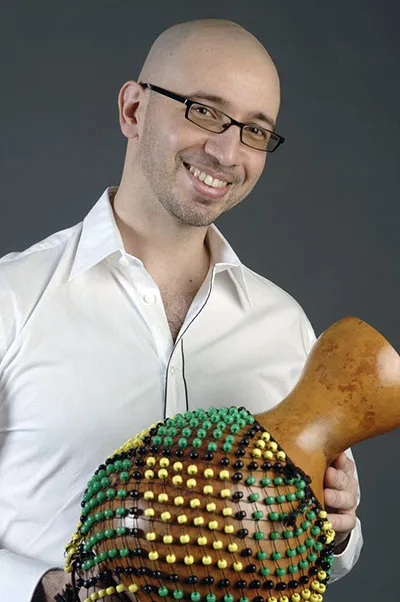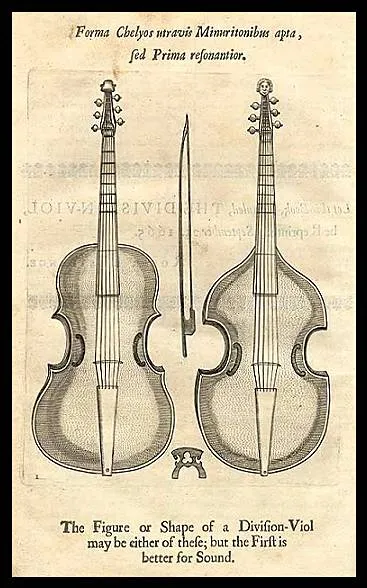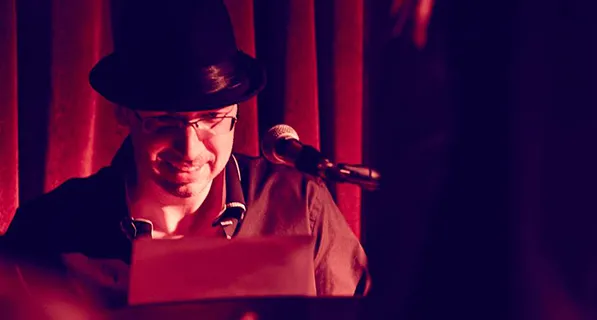Thanks to the fact that in recent days I found on Instagram an old musician friend of mine who has been living in Spain for years, I was able to find a huge musical surprise as well. I must admit that I am a little ashamed of not having been aware of the trajectory of another Venezuelan musician, who has been doing an incredible job and who shows clear signs of genius.
¡Versión en español más abajo!
Spanish version below!
Spanish version below!
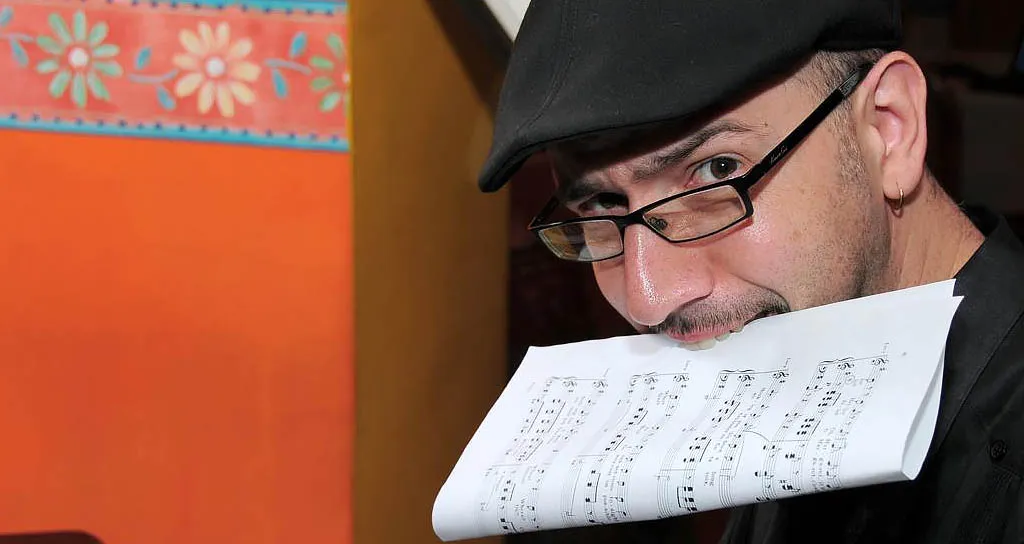
Source - Fuente
We are talking about Gonzalo Grau, a multi-instrumentalist and very multifaceted musician as you will see now.
To understand who he is, it is good to start by knowing that Gonzalo is the son of Alberto Grau, a Venezuelan born in Spain who later became one of the main engines of choral singing in the South American country. He is also the founder of the Schola Cantorum, the most prestigious institution in this field in Venezuela.
He is also the son of Isabel Palacios, an extraordinary contralto, who has also had an impressive career in lyrical singing and is the founder of the Camerata de Caracas, which has been a pillar of early music.
The son of two world-class musicians, little Grau began studying music at the age of three (yes, three). At the age of 13 he joined the Orquesta Nacional Juvenil de Venezuela as a cellist, and at the age of 15 he became a member of the Camerata Renacentista (one of the parts of his mother's project).
With that background in early music and for playing the cello, starting to play the viola da gamba came as no surprise. Likewise, coming from a home where singing was cultivated in such a way, that he started singing was not strange either.
That he played the piano, the complementary instrument for almost all musicians, was not particularly surprising either, but that after receiving a scholarship in 1995 to study at Berklee College of Music, he ended up graduating Sum Cum Laude, as a jazz pianist, was a bit more surprising. After that, seeing him play percussion or any other instrument such as the Venezuelan cuatro was no longer surprising. Even less so if we take into account that he himself says that his first instrument was the drum, because at the age of two he was able to keep an even rhythm and his mother would put him to play while the choir sang to his rhythm.
A characteristic that has stood out in this Venezuelan talent is his ability to adapt to different musical genres. His achievements in academic music are notorious and there he has excelled as a producer and composer. An example of this is his work "Aqua", an oratorio for choir, orchestra and soloist, which has earned him important awards. (The video is included at the end of this post).
But my encounter with him was not on this side, but on the salsa side. For in the same way that he graduated as a jazzman, he is a surprisingly knowledgeable and innovative salsa player who has been able to apply all his knowledge and academic training to Afro-Cuban and Caribbean music. Truly, it must be said, Gonzalo Grau moves well in any genre he ventures into. However, it is fair to mention him in the field of salsa, since he has made this one of his main bastions with the two groups he has in this genre: "Gonzalo Grau y la Clave Secreta" and "Plural".
With La Clave Secreta, he was nominated for a Grammy Award for Best Tropical Latin Music Album. This group is based in Boston, where Gonzalo currently resides, while Plural is his project in Venezuela.
One of the things that surprises me in my ignorance of his work is that there are many points of convergence that we have had, such as the fact that he was in the Camerata with another musician friend, Rubén Guzmán, with whom I have a musical collaboration, since I wrote lyrics to one of his compositions. Also the fact that his mother was the wife of one of the most prominent theater men in Venezuela, a merit equal to that of my father (and this is a very small world). But there were also occasions that we shared without being very clear about it, such as having both participated in a workshop on Cuban music given by the great musician Adalberto Alvarez, during a Latin American music festival held in Caracas.
But, anyway, I feel happy about this great discovery, because his is an incredible music, where there are also very interesting crossovers of academic and Latin music, as in the case of "RumBach", where rumba and Johan Sebastian come together masterfully in the voice of a violin, a double bass and some percussion elements.
This approach is also seen in works such as "Fantasia de Guayaba Habanera", where we can also perceive sonorities of the most varied classical tendencies (a lot of Bernstein), along with others that evoke the great Argentine Astor Piazzola and the flavor of the Caribbean.
In addition to his career in salsa, he has worked with Venezuelan music and has a project to bring a wide repertoire of jazz standards to Venezuelan merengue, of which I have already spoken to you on several occasions.
Gonzalo also has a series of "challenges" with salsa, which I decided to take on and which I will be performing here.
Music videos at the endo of this post!
Official website: gonzalograu.com

Español
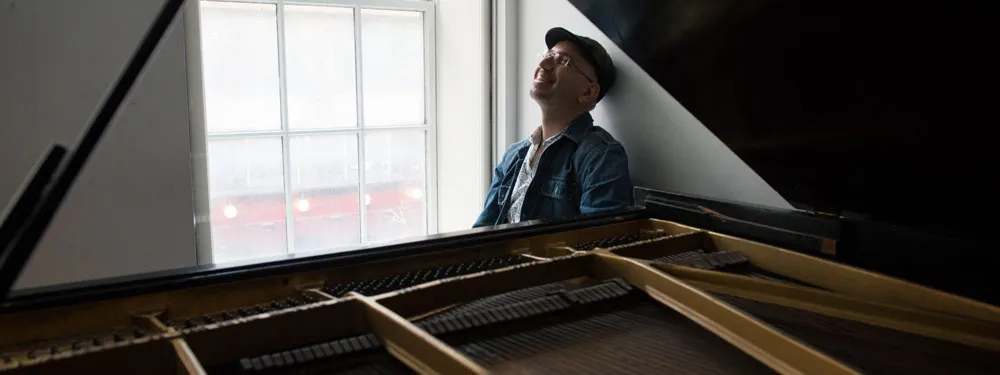
Source - Fuente
Gracias a que en días pasados encontré en Instagram a un viejo amigo músico que tiene años viviendo en España, pude encontrarme una enorme sorpresa musical también. Debo reconocer que me da un poco de vergüenza no haber estado al tanto de la trayectoria de otro músico venezolano, que ha venido haciendo una labor increíble y que da claras muestras de genialidad.
Se trata de Gonzalo Grau, un músico multinstrumentista y muy multifacético como verán ahora.
Para entender quién es, es bueno empezar por saber que Gonzalo es hijo de Alberto Grau, un venezolano nacido en España y que luego se convirtió en uno de los principales motores del canto coral en el país sudamericano. Él es también el fundador de la Schola Cantorum, la institución de más alto prestigio en ese campo en Venezuela.
Así mismo es hijo de Isabel Palacios, una extraordinaria contralto, quien ha hecho también una carrera impresionante en el canto lírico y es fundadora de la Camerata de Caracas, que ha sido un pilar en la música antigua.
Hijo pues, de dos músicos de talla internacional, el pequeño Grau empezó a estudiar música a los tres (sí, 3) años de edad. A los 13 años ya entró a formar parte como violonchelista, de la Orquesta Nacional Juvenil de Venezuela y a los quince años pasa a formar parte de la Camerata Renacentista (una de las partes del proyecto de su mamá).
Con esa formación de música antigua y por tocar el violonchelo, empezar a tocar la viola da gamba no resultó ninguna sorpresa. De igual manera, venir de una casa donde se cultivaba de tal manera el canto, que él empezara a cantar, tampoco resultó extraño.
Que tocara el piano, instrumento que es el complementario para casi todos los músicos, tampoco era particularmente sorprendente, pero que luego de recibir una beca en 1995 para estudiar en el Berklee College of Music, terminara graduándose Sum Cum Laude, como pianista de jazz, eso sí ya era un tanto más sorpresivo. Después de eso, verlo tocar percusión o cualquier otro instrumento como el cuatro venezolano, dejó de ser algo sorpresivo. Menos aún si tomamos en cuenta que él mismo cuenta que su primer instrumento fue el tambor, pues a los dos años de edad era capaz de llevar un ritmo parejo y su mamá lo ponía a tocar mientras él coro cantaba a su ritmo.
Una característica que ha resaltado en este talento venezolano es su capacidad de adaptación en distintos géneros musicales. Sus logros en la música académica son notorios y allí ha destacado como productor y como compositor. Una muestra de ello es su obra “Aqua”, un oratorio para coro, orquesta y solista, que le ha hecho merecedor de importantes premios. (El video está incluido al final de este post)
Pero mi encuentro con él no fue por este lado, sino por el de la salsa. Pues de la misma manera que se graduó de jazzista, es un sorprendente conocedor e innovador salsero que ha sabido aplicar todos sus conocimientos y su formación académica a la música afrocubana y caribeña. Realmente, hay que decirlo, Gonzalo Grau se mueve bien en cualquier género que se aventure. Sin embargo, es justa la mención en el campo de la salsa, pues él ha hecho de este uno de sus principales bastiones con los dos grupos que tiene en este género: “Gonzalo Grau y la Clave Secreta” y “Plural”.
Con la Clave Secreta obtuvo una nominación a los premios Grammy como mejor disco de música latina tropical. Este grupo tiene su sede en Boston, donde reside actualmente Gonzalo, mientras que Plural es su proyecto en Venezuela.
Una de las cosas que me sorprende de mi desconocimiento de su labor es que hay muchos puntos de convergencia que hemos tenido, como el hecho de él haber estado en la Camerata junto a otro músico amigo, como lo es Rubén Guzmán, con quien por cierto tengo una colaboración musical, ya que yo le escribí letra a una de sus composiciones. También el hecho de que su madre fue esposa de uno de los más destacados hombres de teatro en Venezuela, un mérito igual al de mi padre (y este es un mundo muy pequeño). Pero además hubo ocasiones que compartimos sin tener mucha claridad de ello, como fue haber participado los dos en un taller sobre música cubana que dictó el gran músico Adalberto Álvarez, durante un festival de música latinoamericana realizado en Caracas.
Pero, en fin, me siento feliz de este gran hallazgo, pues la de él es una música increíble, donde hay además muy interesantes crossovers de la música académica y la latina, como en el caso de “RumBach”, donde la rumba y Johan Sebastian se acercan magistralmente en la voz de un violín, un contrabajo y algunos elementos de percusión.
También se ve este acercamiento en obras como “Fantasia de Guayaba Habanera”, donde además logramos percibir sonoridades de las más variadas tendencias clásicas (mucho Bernstein), junto a otras que evocan al gran argentino Astor Piazzola y el sabor del Caribe.
Además de su trayectoria en la salsa, ha trabajado la música venezoalan y tiene un proyecto de llevar un amplio repertorio de estándares de jazz a merengue venezolano, del cual ya les hablado en varias ocasiones.
Gonzalo tiene también una serie de “challenges” con salsa, que yo decidí asumir y que estaré presentando por acá.
Página oficial: gonzalograu.com

Videos
Aqua
Suite "RumBach" for J. S.
Fantasia de Guayaba Habanera
Buscando la melodía
Las cajas
Don't You Worry 'bout a Thing (Stevie Wonder)


Music community logo by @ikasumanera | Banner by @equipodelta


@ylich
http://ylich.com
https://sptfy.com/ylich
If you don't have an account at Hive yet, I invite you to read my post My Hive Testimony || Mi testimonio Hive
Si aún no tienes cuenta en Hive te invito a leer mi publicación My Hive Testimony || Mi testimonio Hive

